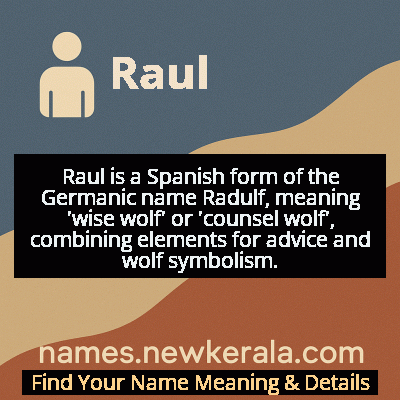Raul Name Meaning & Details
Origin, Popularity, Numerology Analysis & Name Meaning of Raul
Discover the origin, meaning, and cultural significance of the name RAUL. Delve into its historical roots and explore the lasting impact it has had on communities and traditions.
Name
Raul
Gender
Male
Origin
Spanish
Lucky Number
7
Meaning of the Name - Raul
Raul is a Spanish form of the Germanic name Radulf, meaning 'wise wolf' or 'counsel wolf', combining elements for advice and wolf symbolism.
Raul - Complete Numerology Analysis
Your Numerology Number
Based on Pythagorean Numerology System
Ruling Planet
Neptune (Ketu)
Positive Nature
Intuitive, analytical, spiritual, and inquisitive.
Negative Traits
Secretive, reserved, aloof, and can be overly critical.
Lucky Colours
Green, yellow.
Lucky Days
Monday.
Lucky Stones
Cat’s eye, moonstone.
Harmony Numbers
1, 5, 6.
Best Suited Professions
Scientists, researchers, spiritual leaders, detectives.
What People Like About You
Depth of knowledge, analytical skills, spirituality.
Famous People Named Raul
Raúl González Blanco
Footballer
Real Madrid legend with 323 goals and multiple Champions League titles
Raúl Alfonsín
Politician
Restored democracy in Argentina as first elected president after military rule
Raúl Juliá
Actor
Iconic performances in 'The Addams Family' and award-winning stage career
Raúl Castro
Politician
Led Cuba as President and implemented significant economic reforms
Name Variations & International Equivalents
Click on blue names to explore their detailed meanings. Gray names with will be available soon.
Cultural & Historical Significance
Extended Personality Analysis
People named Raúl are often characterized by a unique blend of strength and sensitivity that reflects the name's wolf counsel meaning. They typically possess strong leadership qualities combined with emotional intelligence, making them effective in both professional and personal relationships. The wolf symbolism manifests as loyalty and protective instincts—Raúls are known for fiercely defending their loved ones and principles. They often demonstrate strategic thinking abilities, able to assess situations thoroughly before taking action. Many Raúls exhibit a calm confidence that inspires trust in others, along with a natural charisma that makes them effective communicators. Their personality often includes a strong sense of responsibility and reliability, making them dependable partners, friends, and colleagues. At the same time, they maintain an independent spirit and can be quite resourceful when facing challenges. This combination of traits often leads Raúls to success in fields requiring both analytical skills and interpersonal connection, from business and politics to creative arts and education.
Modern Usage & Popularity
In contemporary naming trends, Raúl maintains a respected position as a classic Spanish name with modern appeal. While its peak popularity has passed in many Spanish-speaking countries, it continues to be chosen by parents seeking a strong, traditional name with cultural significance. In Spain, Raúl ranked consistently in the top 100 names from the 1970s through early 2000s, though it has gradually declined to lower rankings in recent years. However, the name enjoys renewed interest through cultural icons and maintains strong recognition value. In the United States, Raúl has seen steady usage among Hispanic communities, often ranking within the top 500 names. The name's international profile has been boosted by famous bearers in sports, particularly football, making it recognizable globally. Modern parents often appreciate Raúl for its balance of traditional roots and contemporary sound, as well as its association with strength, intelligence, and cultural pride. The name's versatility allows it to work well in both formal and casual contexts, contributing to its enduring appeal.
Symbolic & Spiritual Meanings
The symbolic meaning of Raúl extends beyond its literal translation to encompass deeper metaphorical significance. The wolf element represents not just physical strength but also spiritual guardianship, intuition, and connection to primal wisdom. In many indigenous traditions, the wolf symbolizes teacher and pathfinder, qualities that align with the counsel aspect of the name. The combination creates a powerful archetype of the wise protector—someone who leads through knowledge rather than force, and protects through wisdom rather than aggression. This symbolism resonates with leadership models that emphasize emotional intelligence and strategic thinking. The name also carries connotations of family loyalty and community building, reflecting the wolf's pack behavior. In psychological terms, Raúl symbolizes the integration of instinct and intellect, representing individuals who can navigate both emotional and rational realms effectively. The name's enduring appeal across cultures and centuries suggests it taps into universal human values of protection, guidance, and the balance between individual strength and community responsibility.

